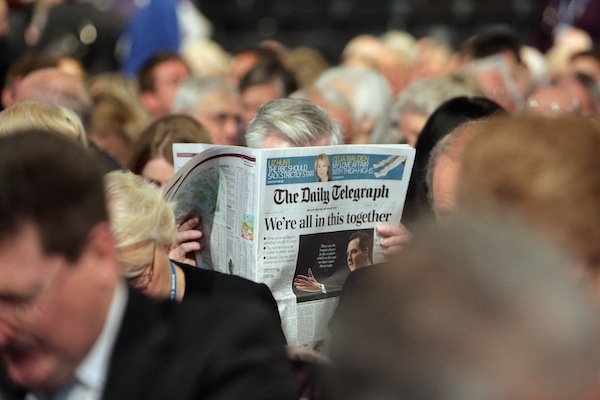Well, this is awkward. Peter Oborne is a friend and The Spectator shares a proprietor with The Daily Telegraph. So there is a danger that anything written in this space will seem craven or kowtowing. Nevertheless, Peter, late of this parish and now late of the Telegraph too, has performed a public service today by resigning his post as the Telegraph’s Chief Political Commentator. He is a man of great conviction and deep principle. Often mistaken, perhaps, but always magnificently worthwhile.
His suggestion that the Telegraph has, shall we say, a rather too cosy relationship with some of its advertisers – and especially with HSBC – is not the kind of allegation made without good cause or serious consideration. Nor is he alone in wondering if the good ship Telegraph sails as serenely as once it did. Many journalists who might once have been reckoned Telegraph types to their toenails have left the paper in recent years, often involuntarily.
Newspapers must, for sure, endeavour to turn a profit. But not at any cost. There is always a risk that pursuing profit at the expense of all else leads to disaster. In the Telegraph’s case their profits might now be reckoned Pyrrhic. Useful, certainly, but extracted at too high a price and worth rather less than a million pound a year advertising account.
The newspaper business has always been unusual. For a long time it sold readers to advertisers just as much as it sold news to readers. (Youngsters may be astonished to learn that once upon a time you needed to buy a newspaper if you wanted to buy a second-hand car or rent a flat.) And every journalist has had the experience of being reminded by someone on the advertising side of the ledger that it’s the commercial team who “pay your wages”. Well, up to a point Lord Copper. No-one has ever purchased a newspaper to discover the display adverts inside.
Still, this required everyone to know their place. Some parts of the business – the travel pages, for instance – have always been, shall we say, distorted by the provision of journalistic freebies. Celebrity interviews in the colour supplements also long since lost most of their journalistic value, being little more than mildly-disguised plugs for the latest movie or show or album or whatever. And, as Peter says, investigating your own proprietor has always been considered poor manners. Sometimes reality can only bear so much daylight.
Nevertheless, the news section is supposed to be different and advertisers are supposed to understand this. A separate set of rules apply. Not least because confidence in the product matters. Readers understand commercial pressures but they also know these need to be kept in check. If a paper’s news judgement is for sale it ceases to be a newspaper. And bleeding respectability in one area tends to leak into other parts of the paper.
Advertisers, of course, are free to take their business wherever they choose. There is no requirement for them to spend their money across a range of newspaper titles. And yet a free press, already menaced by parliamentary forces and special interests, is also too easily threatened by commercial interests. Every paper knows that upsetting advertisers must sometimes go with the territory of being in the news business. This too can be awkward but what is the alternative? Only the sacrifice of your credibility and without at least a measure of credibility a newspaper is doomed. Just look at the Daily Express, once the mightiest organ on Fleet Street but now an object of necessary mockery.
But if the Telegraph is wounded by Peter’s allegations it is also the case that HSBC’s already bruised reputation has taken another battering today. The bank is, as I say, free to spend its marketing budget as it sees fit but the idea it can think it reasonable to bully and threaten newspapers if they dare to run ‘unhelpful’ stories is another example of an over mighty corporation that evidently thinks the world deserves to be arranged in ways that comfort HSBC. Tough.
The evidence HSBC uses its commercial muscle to minimise inconvenient reporting and commentary is not confined to the pages of Private Eye or Peter Oborne’s resignation letter. The Guardian has revealed that HSBC intended to “pause” its advertising in that paper as a consequence of the Guardian’s coverage of the scandals enmeshing the bank. It is to the Guardian’s great credit that the paper told HSBC to get stuffed.
For the Telegraph’s sake I hope Peter’s allegations are unfounded; for his I hope they are accurate. These are sufficiently serious times for the newspaper industry that it can scarcely afford any further self-inflicted miseries.







Comments